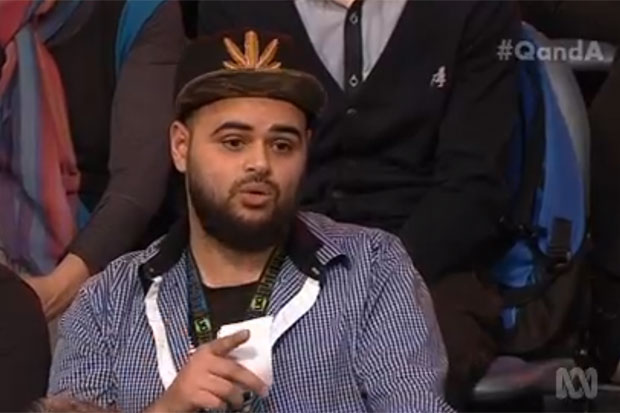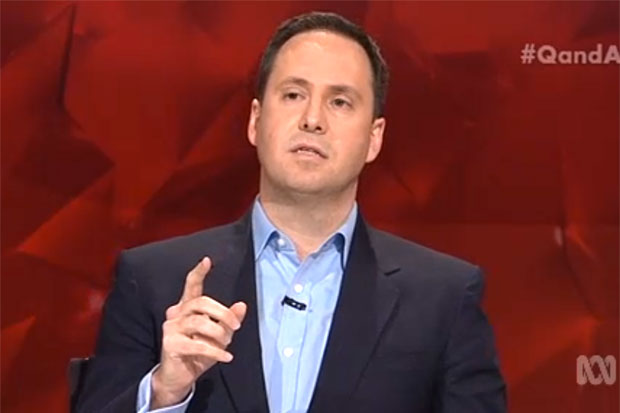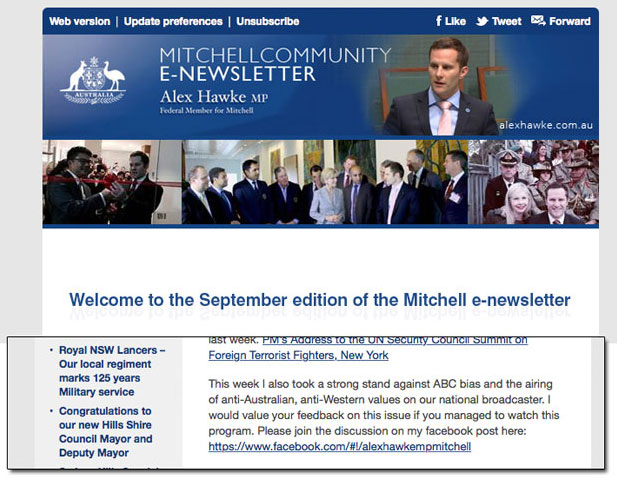How to respond as a Muslim to Zaky Mallah’s appearance on last night’s Q&A program?
For respond we must. We must take to our Twitter and Facebook accounts to condemn, distance ourselves, reflect, commiserate.
We Australian Muslims watched Q&A from the distance of our homes as both audience and involuntary participants. Our participation is forced upon us by a political environment in which being Muslim is a collective state of being.
We have become caught in the tyranny of Muslim as adverb. Watching Muslim. Walking Muslim. Talking Muslim. Driving Muslim. Every action is over-determined by our Muslimness with the result that we are implicated in the speech and actions of strangers, and the overarching narrative of the ‘war on terror’.
When I saw that Zaky Mallah was to ask a question, I tensed up. But not for the reasons you may think.
For me, the issue is not about representation. The issue is not that controversial or silly or 'dangerous' voices should be silenced so that the wider communities of Muslims are not penalised. I was not worried about Mallah misrepresenting Muslims, like a teacher anxious about her students’ behaviour on a public excursion.
When controversial, even stupid voices can speak without such speech affecting all Muslims, then our anti-racism work will be done.

I am against the notion that we Muslims should ‘media-watch’ other Muslims, ‘in case they make us look bad’.
‘What will non-Muslims think?’ is often our instinctive reaction when somebody who happens to identify as Muslim says something unedifying, cringe-worthy or contemptible.
To incorporate this strategy of policing speech into our struggle against Islamophobia is dangerous. It smacks of what W.E.B. DuBois, writing a century ago, called ‘double-consciousness’: a split perspective among black people between how they see themselves and how they perceive themselves being seen by white people.
Not to resist this split perspective allows us to internalise other people’s negative images and judgments.
So long as Anglo Australians have the luxury to not feel an iota of 'guilt by association' when members of the Australian Defence League or Reclaim Australia (or Tony Abbott for that matter) spout their invective, then I will not buy into muzzling 'good' and 'bad' Muslim voices.
I should be able to speak out against 'bad' voices as stupid, inane, egotistical or offensive not because I am embarrassed or worried about their effect on the larger Muslim community, but because they offend me in principle.
When such voices position me and other Muslims at risk of a backlash, the problem is not with Muslims, but with a social and political order that continues to lump us all into one monolithic 'community'.
That Mallah does not speak for Muslims should be self-evident.
I did reel at Mullah’s appearance on Q&A – even before he expressed the view that, “The Liberals now have just justified to many Australian Muslims in the community tonight to leave and go to Syria and join ISIS because of ministers like him.”
But the reason I reeled at Mullah's appearance, even before that comment, was that, quite frankly, I was sure he would have absolutely nothing intelligent or remotely insightful to contribute to the politics of the war on terror, or the proposed citizenship stripping laws.
We are starved for insightful contributions about how, in the name of counter-terrorism, we are willing to dismantle the rule of law by conflating judicial process and ministerial discretion, demonise an entire faith, narrativise Muslims in a way that defines them solely in terms of an undefinable war on terror, and make a mockery of civil liberties.
What we received with Mallah’s performance was an egotistical, misguided, poorly argued attempt to critique the latest overkill in Australia's draconian counter-terrorism legislative arsenal by somebody who seems to have no idea that to speak publicly as a Muslim is to enter a field that has been mapped with reductive tropes and stereotypes in advance.
To understand this burden is not the same as holding oneself accountable to it. Yet it is clear that Mallah can conceive of neither.

I believe the Zaky Mallahs of our society should equally enjoy freedom of speech. We non-Anglo citizens must suffer the racist, offensive and psychologically abusive speech of privileged citizens in positions of power on a daily basis. As contemptible as Mallah’s statements generally are, I do not question his right to speech. It is the quality of his speech, not the freedom part, that has me holding my head in my hands.
Speech is free insofar as media gatekeepers act as bouncers and allow those who ‘freely’ arrive at the door to enter or not. There are choices in giving a national platform to some voices and not others.
Mallah can rant on his twitter account. But to be afforded the privilege he was last night was not something he deserved.
If you are controversial, don't be afraid to speak on my account. But for God's sake please say something that contributes to the conversation and gets people thinking about the politics of counter-radicalisation in a way that doesn't place you at the centre of the debate.
Think: on what basis do I speak? Is it simply because of my individual experience? If yes: best to speak to your friends or open up to a psychologist instead.
If you have some grasp of the political/sociological/power dynamics of this debate, then you will also probably land yourself in trouble, but at least from a sightly more qualified position.
If you do not understand the risks of speech then it is best to remain silent. If you are going for the theatrics of a train wreck, then learn how to drive a train first. Some humility and self-reflection before we all speak would go such a long way.
But there is something even more disturbing and dangerous about this sorry state of affairs. What it proves is how impoverished our public conversations are when it comes to many issues, but especially the war on terror (the ABC has now admitted that it made an “error of judgment” by allowing Zaky Mallah to appear on the program).
In giving a platform to people who fulfill the most reductive and crude caricatures of the Muslim ‘radical’– as if that is the kind of ‘free speech’ marginalized communities are calling for – we in fact play into the hands of those who seek to restrict freedom of speech.
Mallah’s views are now conflated with anybody who challenges the hegemonic ideas and systems of thought in the war on terror. Mallah’s ‘extremism’ is showcased to make the argument that we have reached the limits of free speech and debate on the government’s counter-terrorism strategy.
Liberal backbencher Alex Hawke summed it up perfectly: ‘They [the ABC]have utterly no regard for what they are doing on this show and the people who will suffer the most is the moderate Islamic community in Australia.’
Putting to one side my detestation for the politicized label of ‘moderate’, Alex Hawke and some of his fellow Liberal colleagues are well placed to predict how the speech of some Muslims can result in the suffering of other Muslims.
What his statement mischievously elides is that the chain of causation in fact leads to politicians like him. I know this personally, given the response by Alex Hawke and Federal Liberal MP Craig Kelly to my appearance on Q&A in September 2014, alongside Dr Anne Azza Aly, Curtin University academic and expert in counter-radicalisation, Michael Keenan, Mark Dreyfus and Scott Ludlum.
The main topics for discussion concerned the counter-terrorism raids in Western Sydney, Tony Abbott’s ‘Team Australia’ rhetoric, and the phenomenon of ‘radicalization’ in general.
I expressed many views, but in short my position was to contextualize Islamophobia, demand we address radicalization via a conversation that also examines the role of Western intervention in the Middle East in both participating in terrorism and creating and nurturing the conditions that allow terrorism to emerge, and, finally, question the timing, motives and strategy underlying the government’s counter-terrorism operations and rhetoric.
Many of the statements I made had been made without serious contestation by that privileged breed of media commentators in our society: White Middle Class Males.
There is something about a Muslim woman expressing such views, however, that raises the ire of those in power.
According to Craig Kelly, the appearance of Dr Aly and I, and the views expressed, were ‘so biased and divisive it could be used by Islamic State recruiters as propaganda to recruit disaffected young Muslims in Australia’.

Shortly after the program, I received an email newsletter from Alex Hawke who happens to be my local Federal MP. He informed his constituents (presumably not realizing I was one of them):
“Following last week’s Q&A program I raised with my colleagues my concern about the lack of balance and the airing of anti Western and anti Australian conspiracy theories. The program did us a big disservice and provided a platform for “extreme” views.”
The ABC is a publically funded broadcaster and has a responsibility during serious national security climate to present balanced views. The ABC did a big disservice to our society giving a half-baked conspiracy theory about our Government and also security services and Police. Q&A framed their questions throughout this programme in a way that this conspiracy theory was the dominate view of Islamic Australia.”
There were links to articles quoting him delivering this message in a speech to the Coalition joint party room saying: "This can only needlessly inflame tensions at a time when the Government and the media have a grave responsibility to ensure moderate Islamic views are heard."
What was most startling, however, was that the newsletter included a table depicting ‘the number of responses’ and ‘share of response time’ from each panelist. The panel was described as ‘Coalition’, ‘Labor’, ‘Greens’. Dr Anne-Azza Aly and I were collectively slotted under the category ‘Muslim’. This served to give the impression that we dominated the number of responses and share time.
Questions from the audience were then ‘analysed’ via two categories: ‘Anglo-Australian’ and ‘Arabic/Middle Eastern Australians’.
Given that Q&A does not require audience members to complete a ‘What is your race?’ survey upon entering the studio, I can only assume that this ‘data’ was ‘collected’ based on a robust scientific assessment known as: ‘who looks wog?’ and ‘who looks white?’
After this level of ‘analysis’, I can only presume that anybody who asked a question that was not sympathetic to the government was profiled as an Arab or Middle Eastern Australian, and anybody who was sympathetic was Anglo-Australian.
Aly and I – opinionated, strong women of Muslim and Arabic heritage – were asking tough questions of the government. It seemed it was too much to take in at once.
The implication of all of this was that Aly and I were now presumably radical, extreme, not moderate, un-Australian, anti-Western, conspiracy theorists handing ammunition to terrorism recruiters.
In today’s climate, these labels have serious connotations. To be a Muslim woman with political agency, questioning the actions of government, is to be an extremist, a radical, a lackey for terrorist recruiters. To be moderate is, presumably, to play the role of subservient, compliant stooge.
I am recalling this because it is no surprise that Mallah’s appearance on Q&A will be used to further limit the speech of Muslims. What it highlights is the complexities and pressures of speaking as a Muslim.
Neither Aly nor I said anything particularly original or controversial when we appeared on Q&A last year. And yet we were still branded as extremists. Mallah said some particularly controversial and stupid things. And he is branded as an extremist.
What, then, is the clear and unequivocal message? That the only speech allowed by a Muslim is one that supports the hegemonic narrative and serves the government’s interests.
The only conclusion I am left with is that for this government, there is no difference between people like Aly and myself, and Mallah. If that be the case, what a truly depressing state of public discourse the war on terror has delivered to us; one that has scarified robust debate, national introspection and internal scrutiny not in spite of democracy but – and this is the real tragedy – in the name of it.
Donate To New Matilda
New Matilda is a small, independent media outlet. We survive through reader contributions, and never losing a lawsuit. If you got something from this article, giving something back helps us to continue speaking truth to power. Every little bit counts.





